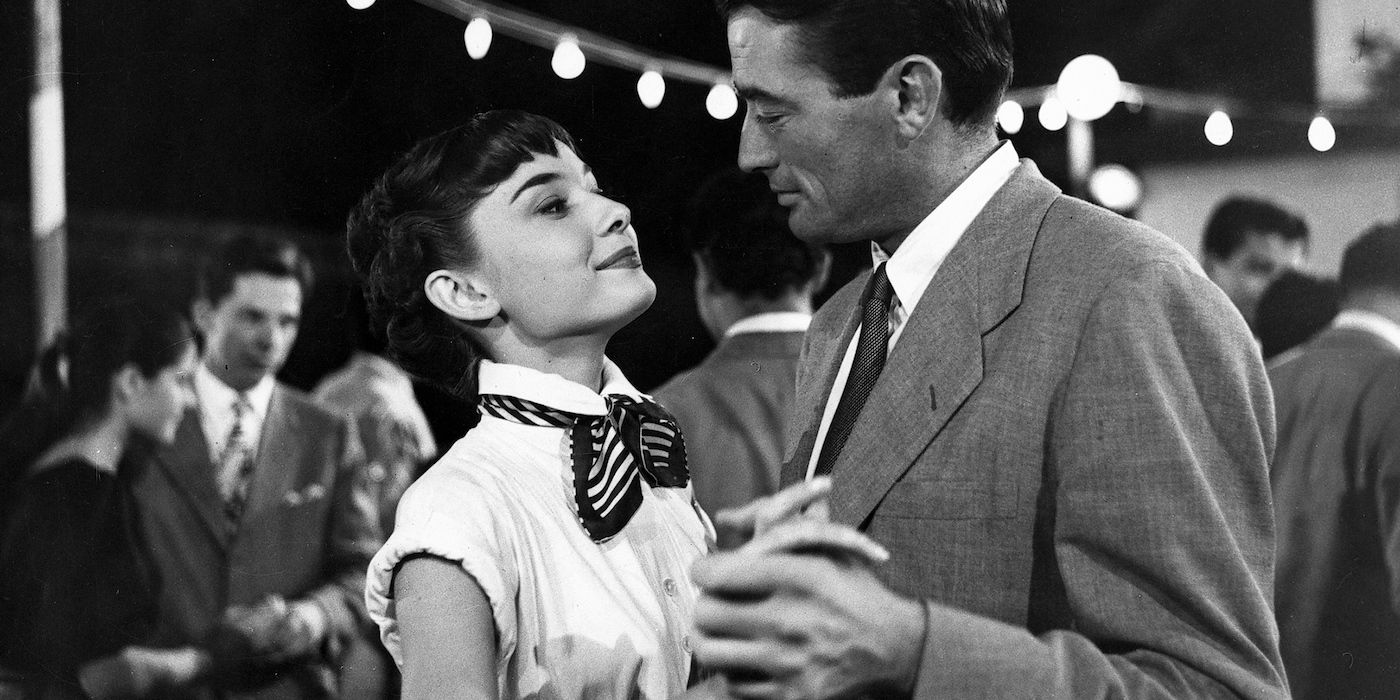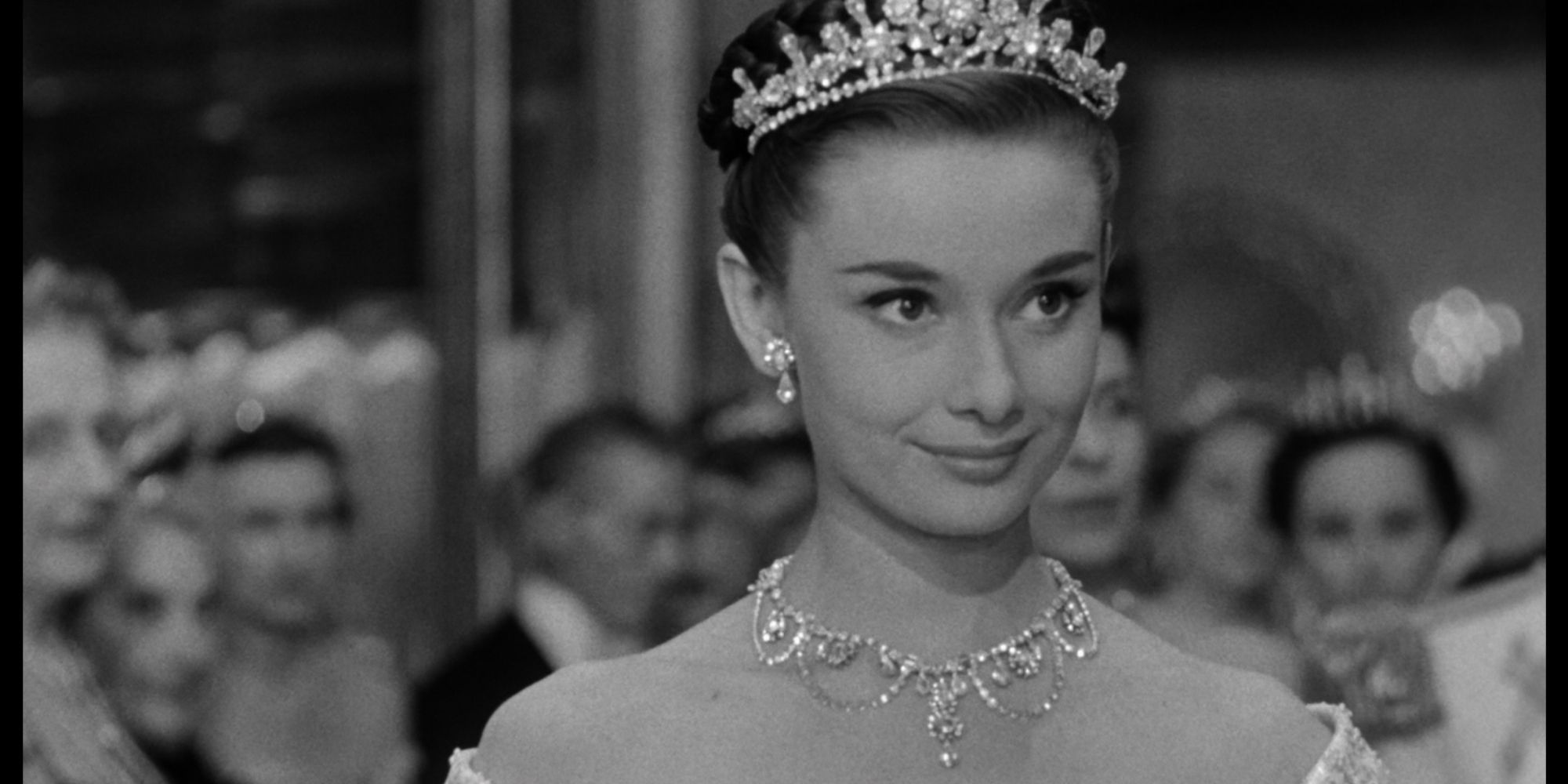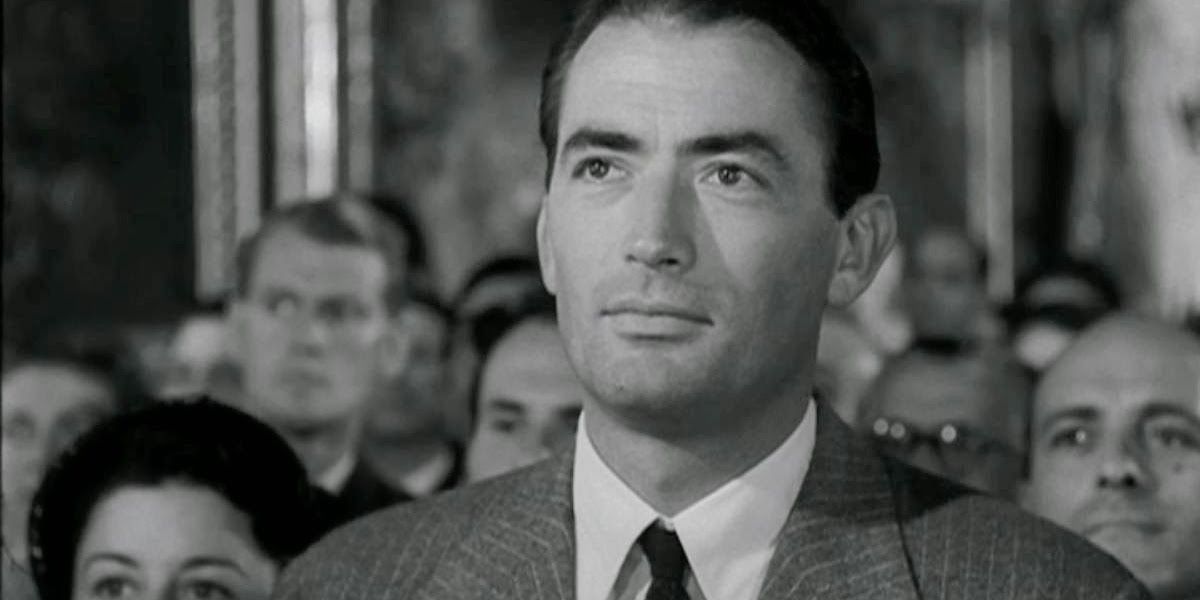It would be tempting, in the wake of certain memoirs, Netflix specials, and Oprah interviews, to reinterpret Roman Holiday as a fitting reflection of the plight of modern monarchy. The elements are there: a disaffected younger monarch, rather unscrupulous members of the fourth estate, and a whirlwind romance offering a chance of release. There’s even the prospect of leaving behind the mother country.
But the possible connections with the Duke of Sussex can only stretch so far. There’s no all-consuming sibling rivalry in this royal family, nor is there a devastating childhood loss. Princess Ann (Audrey Hepburn in her Hollywood debut) doesn’t blame the press for the vast majority of unpleasantries in her life, and indeed, reporters’ attentions have nothing to do with her wanting to leave monarchy behind. Love doesn’t win out in the end in film; the royal steps back into the fold, the lover off into the sunset. But where the most famous real ex-royal of the 21st century has largely given the world a picture of resentment and tension, the fictitious Ann and all her castmates seem appreciative of this episode in their lives by story’s end.
What Is 'Roman Holiday' About?
Not that it starts that way. Princess Ann’s loaded routine of prescribed formalities isn’t exactly tortuous labor, but it’s easy to understand why it would be maddening, and she’s clearly burnt out by the time she reaches the Italian leg of her goodwill tour. When a well-intentioned (if somewhat irresponsible to modern eyes) doctor administers a sedative and advises the princess to take a little time for herself, she slips past her keepers into the nightlife of Rome, where she comes close to passing out on the streets. It’s in this sleepy, loopy state that reporter Joe Bradley (Gregory Peck), of a somewhat tawdry American publication, comes upon her, takes pity, and gets her under a roof – his roof – for the night. It’s only the next morning, when caring for the girl has made him late for work and mildly irritated, that he realizes he's stumbled upon the visiting royal he was meant to cover.
'Roman Holiday's Romance Works Because of Its Leads
A romance like Roman Holiday lives or dies by the strength of its two leads, and Audrey Hepburn and Gregory Peck have plenty. With how much of an icon Hepburn has become in the past half-century, it’s a little strange to look back on her first major film and think that this was what won her an Oscar. It’s very difficult to imagine the Academy granting any performance in a light romantic comedy more than a nomination these days. But Princess Ann is a much harder character to play than might be recognized at first glance. Given the tone of the film and the nature of her frustrations with her title, she couldn’t be too angry or disconsolate, lest she come off as spoiled. The story depends on her being sheltered from everyday life and curious to explore it, but if her naïveté were carried too far, she’d come off as stupid. On the other hand, her figuring out the routines of ordinary life too easily would be incongruous with the story. And if the whirl of duty, regret, and ultimate gratitude experienced by Ann at the end of the film wasn’t handled just right, the character’s development would come off as arbitrary.
Hepburn navigated all of this with remarkable skill for someone as young and new to movies as she was at the time. Her Ann is intelligent and a quick study, but convincingly charmed by buying ice cream, having control over her own haircut, and other basics most can take for granted. Her inability to shed her formal manners of speech leave her marked as a fish out of water, but she’s never so stiff that she can’t roll with the society around her. And her slightly guarded attitude around Peck’s Bradley, gradually giving way to trust and affection for his protective, mentoring persona, has a lovely elegance to it.
Of course, Bradley is putting on a front, at least at first. Stuck in a newsroom he doesn’t think much of in a country he’d rather not be in, Bradley sees an exclusive interview/exposé of Princess Ann’s day out in Rome (masked by an official statement that she’s ill by nervous courtiers who’ve no idea where she’s gone) as his ticket back to New York. This drives him to a certain level of duplicity, with his fellow journalists, his landlord, and the princess herself, whom he leads to believe he’s simply an altruistic salesman. Bradley and photographer pal Irving Radovich (Eddie Albert) collude to get some wild snapshots and incidents for their invaluable scoop, with Ann none the wiser until the very end.
Gregory Peck's Role Has its Own Challenges
Bradley is a character who needs to do, if not a complete 180, then a significant course change by the third act. The plot, and shifting social mores over the last few decades, can frustrate that journey for a modern viewer to some extent by weakening his initial position. Bradley speaks of his potential story as either political or a great scandal, and an interview in either guise. But even allowing for the fact that he’s hiding his job from her, Bradley asks Ann very few questions that could amount to sensational copy. No one else in the city of Rome recognizing a world-famous princess is a bit of a cheat. And with the threshold of royal or celebrity scandal having risen through the years thanks to reports on destructive acts of sex, drug use, and corruption, a princess spending one day out on the town doesn’t seem that juicy a scoop. I imagine pictures of the younger British royals having their first cigarette, settling up with the police after a scooter accident, or bashing presumed assailants with a guitar would be consumed by the tabloids for a day or two, but it’s hardly the worst a royal has done in public.
There’s also the question of just what is enough to make a person change their mind. Bradley goes through several charming adventures with Ann before their brawl with plainclothes agents looking for the princess, and it’s not immediately apparent that said brawl should make him heed his conscience about taking advantage of an unsuspecting woman any more than the others. Two things work to sell the shift: the initial meeting, when Bradley is unaware of who Ann is and demonstrates an exasperated but good heart; and Peck’s careful control throughout his performance. It’s easy to imagine an actor more known for comedy giving, or being asked to give, a broader performance that would lean more heavily into fits of scheming, frustration, or bluster. Besides risking turning the story into a farce, that would make his con of Ann unbelievable and his early show of goodwill a tack-on for the sake of likability.
Peck, who underplays throughout the film, is imminently convincing as a deceiver with a heart of gold. His attitude with Ann while perpetrating his scam isn’t too far removed from Bradley’s true self. You get the sense that this is a man who would ordinarily not go to these lengths if his material circumstances – not impoverished, exactly, but struggling and far from home – weren’t so rough. As the, for want of a better term, “straight man” to Hepburn’s naïve princess, Peck never gets too upset or too complacent. Their mentor-mentee dynamic is so good that it’s tempting to imagine the film as being just about that, an older man guiding a lost young woman through a particular episode of life, without the journalistic scheming or the turn toward romance at the end. But as this romance ends quite decisively with Ann’s return to duty and Bradley’s surrender to his conscience, that element does ring true as a passion of the moment. The film ends with the sense that, unhappy though they might immediately be, both Ann and Bradley are well aware of how positive their day in Rome has been for one another and will recover to a better, more contented place.
The sights of Rome, a playful musical score by Georges Auric and Victor Young, and some choice performances by the supporting cast all serve to give Roman Holiday an appropriate measure of class. But this is a duet above all else, and an expertly performed one by both parties.
Rating: B



